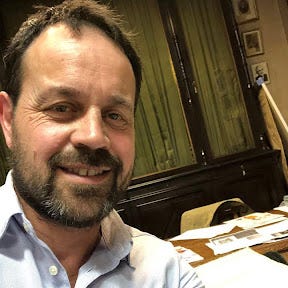My unrequited love for French went back decades. I’d made two failed attempts to win her to my side.
First, when I was twenty-one. I bought Mastering French I while backpacking around Australia and worked through it diligently in trains, coaches, and cafes. But the book taught phrases instead of the building blocks of the language. I learned nothing about the grammar and had no idea how to say the words out loud. I got almost nowhere.
I returned to the language in the year I turned forty. I bought an “Easy French Reader” and worked through it over and again. It taught me enough to read public signs and bits of Le Monde when we visited Paris for five days in 2010. But I was still a long way off from real reading and sentence formation.
I downloaded the Duolingo app in 2014 and embarked on the French course. I liked how it looked, how the lessons were set out, and the inductive approach. It quickly grew my vocab and taught me how to put together simple sentences. This new knowledge gave me access, in turn, to two more important steps forward.
The first was the French news app Le Point, whose stories I could now begin to read, especially given their strong context. The exceptions were the political articles—French politics is far too opaque for an Australian.
The second step forward was the French Bible. I’m quite familiar with the English Bible and was able to use my newfound French knowledge to reverse engineer what I was reading, and to further improve my vocab and grammar. While coming to grips with Le Point and La Sainte Bible I kept at Duolingo every day.
Then in 2015 I commenced French studies at the University of Tasmania. Thanks to Duolingo I hit the ground running and kept up comfortably with the twice-weekly classes. The university course added many new layers of grammar to my burgeoning vocab, and finally got me going with speaking and writing.
In 2017 I undertook, for my final-year master’s project, the translation and analysis of a nineteenth-century book of French sermons, Les Adieux (1857) by Adolphe Monod. I found that the old-fashioned language stuck closely to the classical grammar that I was learning at university. I kept Duolingo going all the while: it provided that daily-schedule reinforcement and practice that I needed.
I enjoyed the translation work so much that in 2018 I began looking for a French text to research at the doctoral level: something that was important in France, but which was untranslated and unknown in English.
I chanced upon a collection of forty-eight letters written by Marie Durand, who is quite well known in southern France. Durand was born in 1711 and was imprisoned at the age of nineteen because of her Protestant beliefs (the practice of the Protestant faith was illegal in France between 1685 and 1788). She was incarcerated in the dreadful Tour de Constance on the Mediterranean coast for thirty-eight years and was only released in 1768, when public opinion turned against the oppression of religious minorities.
Durand was intelligent and literate and wrote letters on behalf of her fellow prisoners seeking charitable help and political advocacy. She even wrote to the Queen of France. Sixteen of her surviving letters were written to her orphaned niece in Geneva, full of words of love and motherly care.
I wrote a proposal to translate Marie’s letters, and to analyse and interpret them in the context of her life and religious heritage. In May 2018 I was accepted into a doctoral research program at the University of Western Australia in the city of Perth, where I was born.
At the end of 2018 I visited Marie’s home in Bouschet-de-Pranles in southern France, and her prison in Aigues-Mortes. Many were surprised that an Australian was so interested in an eighteenth-century French prisoner. The highlight of my research trip was being granted access to Marie’s original letters in a Parisian archive. To hold her actual letters in my hands was deeply moving and a tremendous privilege.
After four-and-a-half years of patient translation, a mountain of reading in both French and English, and thousands of hours of thinking and writing, I submitted my completed project in December 2022. The examining professors, one from Paris and the other from Melbourne, commended the accuracy of my translation. (I am grateful for a supervisor who checked my work at every step of the way.) I passed my viva voce in March 2023 and graduated that July.
I am thrilled that Marie Durand’s letters are now available to an English-speaking readership; I feel that I have brought a little more recognition to a very brave and remarkable woman from the past.
I kept Duolingo going throughout the doctoral program (my streak is well over two-thousand days) and I found that the discipline of listening and learning every day helped me to maintain the necessary daily focus on my research.
Duolingo was not the only teacher to help me complete a doctorate in French translation and history. It did however give me the basic tools and a big confidence boost to tackle French studies at university, and eventually to translate and analyse texts at the master’s and PhD level.
The green owl is now an old friend and coach, a familiar and friendly face gently urging me ever onward.
My warmest thanks to the Duolingo team. I hope that my story may inspire others to press ahead with their own studies!
Working in La Bibliothèque de l'Histoire du Protestantisme Français in Paris in 2018.
My thesis is here and my translated letters and biography of Marie Durand will be published by Wipf & Stock in 2026.



